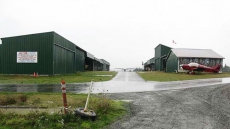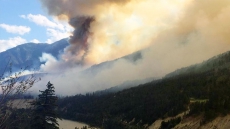EDMONTON — Virtually all southern Alberta streams that spawn native trout are threatened by industrial development or overuse, says a survey from a respected fisheries biologist.
That's even though both bull and rainbow trout are protected under federal law and are supposed to be benefiting from a recovery plan, says Lorne Fitch.
"I have watched habitat and fish populations crater," says Fitch, an adjunct professor at the University of Calgary, who spent 35 years as a leading provincial biologist. "All of our systems are under extreme pressure."
Fitch studied 54 small rivers and streams that flow into the Oldman River and hold bull and cutthroat trout. He found nearly every one of the waterways face multiple pressures: from logging roads to energy development to off-highway vehicle trails.
The banks of Hidden Creek, spawning waters for up to 80 per cent of the Oldman's bull trout, are weakened by clear-cuts and stream crossings and are falling in on themselves. Cow Creek, with a confirmed cutthroat population, is contaminated by feedlot effluent and is drained for irrigation.
Fitch's survey notes everything from motorcycle races to washed-out bridges to coal mining affecting creek after creek. Again and again he concludes "long-term cumulative impacts on cutthroat trout and bull trout."
Scientists suggest land that contains trout streams shouldn't have more than about just over half a kilometre of trail, cutline or road per square kilometre. The disturbance density in parts of the Oldman watershed is nearly 10 times that.
The reason, Fitch said, is sediment. Nearby roads, forest disturbance and stream crossings all cause soil to wash into the current.
Scientists used to believe that silt simply washed out. No longer.
"What researchers are now finding is that this sediment actually starts to get trapped into the gravels and cobbles that make up the stream bed," Fitch said. "That stuff solidifies, so that not only is it difficult for water to permeate through, it's very difficult for trout to build a redd (nest).
"Trout would have to come equipped with a pickaxe to break through some of that substrate."
And those hardpack streambeds aren't going away anytime soon, said Fitch.
"Some researchers have said this might endure for centennial time. It isn't fleeting."
The result is that cutthroat populations are estimated at five per cent of historic levels. Bull trout — Alberta's provincial fish — have lost at least 70 per cent of their original range.
Biologists used to count more than 100 redds on Hidden Creek. Last fall, after the region was logged, Fitch counted 15.
Alberta's previous Tory government completed a land-use plan for the entire South Saskatchewan River watershed, which includes the Oldman. Fitch said it barely mentions fish, contains no specific recommendations for their protection and defers most important decisions to local management bodies.
"I was underwhelmed."
Fitch said the decline over the last generation or two in southern Alberta has been echoed all over the province.
Arctic grayling, once common in the north, are down to 10 per cent of historic levels. Goldeye have all but vanished from rivers where they formerly abounded.
The declines will continue until Alberta changes its land-use policies, Fitch said.
"We have applied too many things to the landscape for too long."
A spokeswoman for NDP Environment Minister Shannon Phillips acknowledged trout are in decline. But Laura Tupper defended the previous government's plans.
"Headwaters protection, controlling industrial activity and monitoring water quality are just a few measures under the (plan) that will work to improve threatened fish populations," she wrote in an email.
Tupper said the government is spending $10 million to restore streams damaged in the 2013 floods and to support other watershed management efforts.



